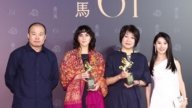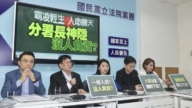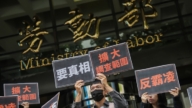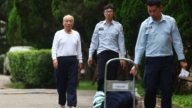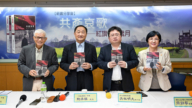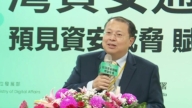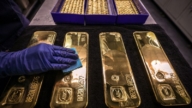【新唐人2011年12月5日讯】中华民国2012总统大选首场电视辩论会12月3号登场,现任总统兼国民党候选人马英九、民进党候选人蔡英文及亲民党候选人宋楚瑜首度同台,就内政民生、两岸外交等问题交锋,引起海内外高度关注,中共当局及媒体却保持低调,而大陆网民则羡慕并热烈议论台湾民主盛事。
首场辩论会是台湾总统大选三场电视辩论之一,由台湾公共电视台与《中央社》以及四家报纸合办,另有30多家媒体连线报导。辩论会分申论、媒体提问、候选人诘问和结论四段。
在两岸关系部分,马英九表示,“不统、不独、不武”是台湾的主流民意,“九二共识”也就是“一个中国,各自表述”符合宪法,是搁置争议、共创双赢的最好办法。
马英九:“民进党最不让人放心的,就是没办法处理两岸关系,制造冲突造成烽火外交,我们愿意回到民进党执政时候,8年台海紧张关系的台湾吗?”
民进党候选人蔡英文则表示,两岸之间有1992年的会谈,但是没有所谓的“九二共识”,如果政府领导人接受一个不存在的东西,是不对的事情。
蔡英文:“‘九二共识’是国民党跟共产党的一个共识,2008年马总统就任以后,把这个国共的共识,没有经过民主的程序,把它转化成为一个两岸的共识,这是一个伤害台湾民主最大的地方。‘台湾共识’讲究的是一个民主的程序。”
蔡英文提出,“台湾共识”是具有包容性的,也可以将“一中各表”纳入一并讨论,从而才能化解内部分歧,为两岸关系的发展找出可长可久的新互动基础。
马英九则表示,所谓“台湾共识”像个百宝箱,好像什么都有,但不知道哪个才是共识。如果不承认“九二共识”,两岸关系将陷入不确定,对台湾非常不利。
台湾媒体引述北京涉台权威人士的话表示,大陆从国家领导人到国台办主任王毅,近来在各项场合重申,“九二共识”是两岸开展对话协商的必要前提。但如果民进党不接受“九二共识”政治基础,未来两岸关系如何向前走?
台湾时事评论家林保华:“中国当然是支持马英九,当然支持它也不敢太公开,太公开台湾人会反感,说你国共勾结、你国民党想主宰台湾的命运。中国本来一直是不表态的,其实每次选举中国方面都释放一些所谓‘善意’,但是这些台湾人并不买账。在这情况下,中国觉得收买不行的话就恐吓了。”
在辩论会上,对于马政府签署的两岸经济合作架构协议(ECFA),宋楚瑜给予正面肯定,蔡英文也由过去强烈反对,转为可以概括承受。
台湾媒体民调显示,这场辩论马英九先胜一筹。香港媒体赞誉台湾主办媒体提问不留情面,表现出“第四权力的风范”。
中共当局没有对此辩论会作出回应,大陆中央级媒体如《新华社》、《人民日报》、《央视》显得十分低调,仅作简短或转载报导。
而大陆网民对台湾总统大选辩论议论热烈。有的网友说:“这样的君子之争!太给力!震撼!两岸政治文明高下立判。”更有网友问:“什么时候可以办国家主席直选辩论?”
北京宪政学者陈永苗表示,台湾大选的民主示范会在大陆产生很积极的启蒙。
陈永苗:“它会成为一个积极的样板。所有的经济、社会条件、文化条件都差不多,既然台湾可以民主化,都可以民主选举,而且民主会给台湾或者中华民族带来很大的利益、或者带来很多的好处。那大陆人民自然通过现有的资讯条件、通过互联网、电视看得到,就相当于它们慢慢都一直在做民主化的宣传,台湾因素﹙民主﹚的存在会加速中国民主化的进程。”
辩论会最后结论时,马英九强调,挑战经济问题,促进两岸和平,他最受信赖。蔡英文指出,她不容国家主权被霸凌。宋楚瑜则说,他要重现台湾人民对政府的信任。
新唐人记者易如、李元翰、周平采访报导。
Low-Key CCP vs. Heated Civilians over 2012 Taiwan Election,
The 2012 Taiwan presidential election of the Republic of
China kicked off on December 3.
The first televised presidential debate was initiated between
Ma Ying-jeou, incumbent President and Kuomintang (KMT) candidate,
Tsai Ing-wen, the Democratic Progressive Party (DPP)
candidate, and James Soong Chu-yu, the People First Party (PFP) candidate.
The debate covered issues including internal affairs of people’s livelihood,
And cross-straits diplomatic relations.
The debate attracted attention both home and abroad,
while the Chinese Communist Party (CCP) regime and its official media did not profile it highly.
Mainland China’s netizens, in contrast,
held heated discussions over this democratic election.
This is the first of three televised debates for Taiwan
presidential election,
co-organized by Taiwan’s public television stations,
Central News Agency and four newspapers,
with on-line reports by over 30 media outlets.
The format for the debate went through four phases:
scripted openings for each candidate,
questions from the media, questions from candidates to
their rivals, and scripted summations.
On the debate over the cross-straits relation issue,
Ma Ying-jeou said that Taiwan’s mainstream public opinion is the “no unification,
no independence and no use of force" principle.
The 1992 Consensus, i.e. “one China, respective
interpretations" is in line with the Constitution,
the best way for the two sides to shelve differences and
create a win-win.
Ma Ying-jeou, “The least reassuring thing of the DPP is their
inability to handle cross-strait relations.
They created conflicts which triggered scorched
earth diplomacy.
Are we willing to return to the eight-year’s reign of the DPP
that features strained relations across the Taiwan Strait?"
The DPP candidate Tsai Ing-wen said that the meeting
was held between the two sides in 1992,
but without reaching the so-called “1992 Consensus".
If a government leader accepted a non-existent thing,
it is not right.
Tsai Ing-wen," The 1992 Consensus is a consensus reached
between the KMT and the CCP.
After taking office in 2008, President Ma turned this consensus,
without going through a democratic process, into a one between two sides.
This is the biggest focus that hurts Taiwan’s democracy.
The spirit of the Taiwan consensus is via democratic processes.”
Tsai Ing-wen states that the Taiwan consensus is inclusive,
“one China, respective interpretations" can be incorporated into the discussion to settle internal differences
and find a sustained new interactive basis for the
development of cross-strait relations.
Ma Ying-jeou argues that the so-called Taiwan Consensus
is like a treasure chest, with everything in it, but one cannot tell which is the consensus.
If the “1992 consensus" cannot be recognized,
the cross-strait relations will be plunged into uncertainty, which is definitely not conducive to Taiwan.
The Taiwan media quoted a Taiwan-affairs related
authoritative official, saying that in terms of mainland China,
from national leaders to Wang Yi, director of State Council
Taiwan Affairs Office, reiterated that the “1992
consensus" is the necessary prerequisite for two sides’
negotiations and cross-strait dialogue.
But if the DPP does not accept the political foundation of
the “1992 Consensus", then how will the cross-strait relations move forward in the future?
Taiwan commentator, Lin Baohua: “China’s regime
Certainly supports Ma Ying-jeou.
Of course, it dares not to make it too open.
This could incur Taiwanese resentment,
saying that the CCP colludes with the KMT,
while the KMT wants to dominate the fate of Taiwan.
China’s regime have long been holding its fire,
while in reality, at each presidential election,
it released some so-called “goodwill",
but the Taiwanese think nothing of it.
In this context, if China’s regime’s approach is that
if buying off doesn’t work, then they will turn to threats. “
Over the debate, the Economic Cooperation Framework
Agreement (ECFA) signed between by the Ma government
And the CCP regime was given applause by James Soong.
Tsai Ing-wen expressed general acceptance, diverting from
his past strong opposition.
Taiwan media poll showed that
Ma Ying-jeou got leverage from this debate.
Hong Kong media praised Taiwan sponsored media’s
unflinching questions to the candidates, displaying “the fourth power’s style”.
The CCP regime did not respond to this debate.
Its central-level official media like Xinhua News Agency,
People’s Daily and CCTV did not give it a high profile,
only making brief reports or reproduction.
In contrast, China’s netizens held heated discussions over
this election.
A netizen posted, “A joust among gentlemen! Brilliant!
Shocking!
You can tell instantly the difference of political civilization
between two sides. ”
Another netizen asked,
" When will they hold China’s presidential debate? ”
Beijing-based constitutional scholar, Chen Yongmiao,
believes that Taiwan’s presidential election has set a
democratic model for mainland Chinese people,
and will give a very positive enlightenment to them.
Chen Yongmiao: “It will become a positive model.
The general economic, social and cultural conditions are
similar between the two sides.
Taiwan has held a democratic election, and democracy
brings Taiwanese people great benefits.
Now the mainland Chinese people can get the information
via internet or TV.
That equals to a gradual awareness of democratization.
The existence of Taiwan’s democracy will accelerate
China’s democratization process. “
At the end of the debate, Ma Ying-jeou stresses that
he is the most trusted to challenge the economics issues
and to promote cross-strait peace.
Tsai Ing-wen says that she will not to tolerate any bullying
over the national sovereignty.
Soong states that he will bring back the Taiwan people’s
trust in the government.
NTD reporters Yi Ru, Li Yuanhan and Zhou Ping



